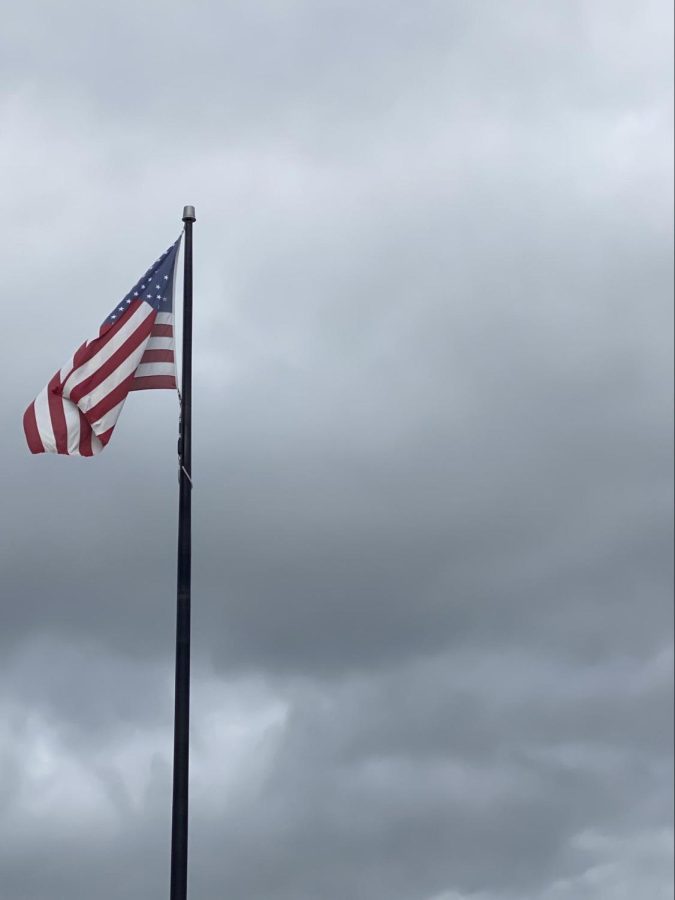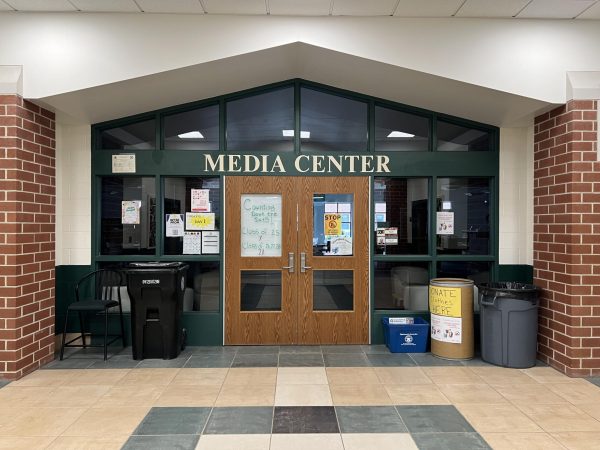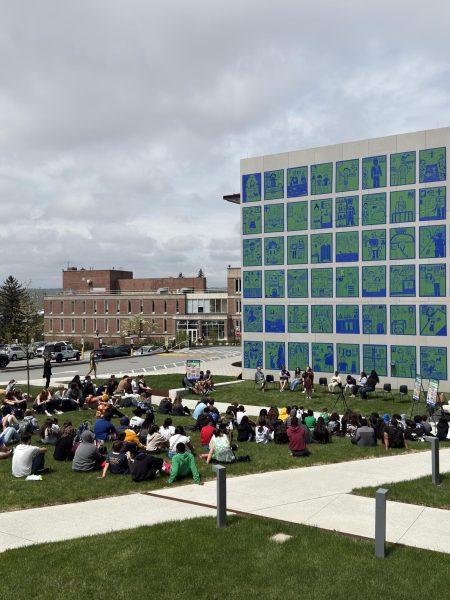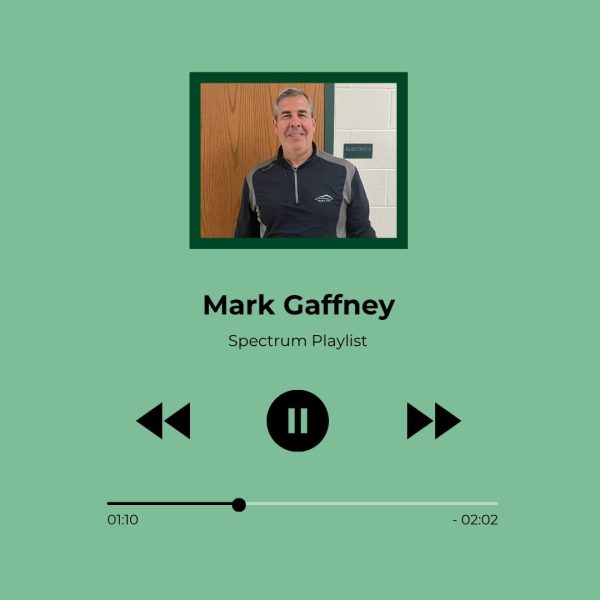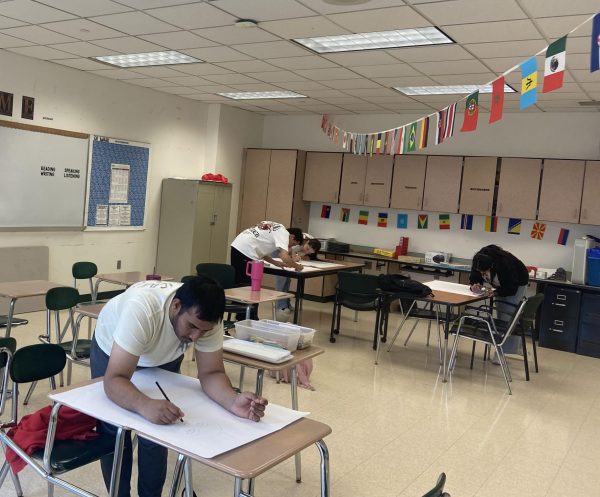For Which It Stands: A Re-Examination of the Pledge of Allegiance
The flag flies under cloudy skies outside DHS.
Every morning all DHS students hear the same words traveling through the school’s intercom system, spurring a vocal representation of biased American history. “I pledge allegiance to the flag of the United States of America and to the Republic for which it stands, one Nation under God, indivisible, with liberty and justice for all.” If you choose to participate in the repetition of this statement each morning, you have pledged your allegiance to the U.S. about 180 times a year. For something so habitual and prominent in our school’s morning routine, an analysis is needed of these words we’ve been taught to recite.
Developed by Francis Bellamy, the original form of the pledge wasn’t tailored to the U.S., it was created to be used by any country. Written as, “I pledge allegiance to my Flag and the Republic for which it stands, one nation, indivisible, with liberty and justice for all.” One major difference that is extremely significant is the addition of “one Nation under God.” This supplemental piece was added during the rise of communism in the 1950s by president Dwight D. Eisenhower who added this to emphasize the morality of the U.S. during the conflict. In return, embedding the assumption of immorality onto the communist side of the war, characterizing communist countries at the time as unholy.
The addition of God and the belief that it embodies creates a very powerful addition, suggesting undertones of religious faith and loyalty. According to a census of American religious affiliation done by the Public Religious Research Institute for the year 2020, about 70% of Americans identified as Christian while 23% of Americans identified as unaffiliated. That 23% of the population of citizens under 18 in the U.S. for the year of 2020 is equal to 16.8 million children. Taking into consideration that Nebraska, Wyoming, Vermont, and Hawaii all have state legislation that doesn’t require the pledge of allegiance to be recited in school, a large chunk of religiously unaffiliated American youth still remains to be indoctrinated by the idealisms behind the pledge that isn’t a part of their identity or lifestyle.
The contrasting view – of not exposing children to Christianity in schools – on the basis that it interferes with the Constitutional First Amendment right to freedom of religion, has been ferociously debated. To understand how religion has become such a focal point of debate and U.S. politics, the history of the U.S. must be acknowledged. Christianity has long been a part of the foundation of the U.S. government despite claims of separation between state and church, including, but not limited to, the assimilation of Native Americans by enforcing Christian rituals and education, and the recent overturning of Roe v. Wade, influenced by the beliefs of religious groups. By having the future minds of the U.S’s leadership and society obligated to listen to a religiously influenced pledge, the implantation of Christianity is essentially a part of school morning announcements in 46 states.
To entertain the various interpretations of faith, the word ‘God’ isn’t always used in reference to the God of the Christian Bible. ‘God’ has been a word used to symbolize figures of worship and creation through many religions: Allah for Islam, Yahweh for Judaism, and simply an entity of great energy for those of spiritualistic affiliation. Without the context of who added the notion of God to the pledge, it may seem like an undemanding representation of universal power. Taking this into consideration, the fact that President Eisenhower identified as a Presbyterian, a subgroup of Christianity, reinforces the definitional bias behind “one Nation under God.”
While Massachusetts state law doesn’t require students to recite the pledge, teachers who don’t participate for two consecutive weeks can be fined $5 for each period of time. In other states, the consequences can be harsher and finding a way to exempt yourself can be more difficult. In Texas, Florida, and Pennsylvania, students must have a written exemption from their parents to opt out of the pledge. In New Jersey, a student can refuse to recite the pledge but must stand at attention. Similarly, in Virginia, students can exempt themselves from the pledge but must have knowledge of it and be able to demonstrate this knowledge. The majority of other states simply require that exempt students stay quiet and respectful during the pledge or outline no other requirements as is the case in Massachusetts.
Another aspect of the pledge that I view to be problematic is the statement “justice for all.” Connecting back to the religious assimilation of Native Americans, the U.S. isn’t known for being an equally-just country. African Americans are incarcerated at a disproportionate rate in comparison to Caucasian Americans and have faced cruel and immoral treatment by the U.S. government all throughout history up to the present. One infamous example being the Tuskegee Syphilis Study. In this study, 600 African Americans were non-consensually entered into a research program that diagnosed 399 of the 600 with syphilis in return for free meals and other aid. Once diagnosed, these men weren’t told that they had syphilis. Once penicillin was developed, the diagnosed subjects were refused treatment, resulting in only 74 of test subjects surviving. Why should justified patriotism be germinated in the minds of American children when the structure and existence of our country was built upon the destruction and plunder of minority lives?
We are in an age when religion is becoming less and less important to younger generations, when religious affiliations of political agendas are being noticed, and when corruption in religious organizations is being investigated. The mistreatment of minorities is still occurring and legislation has been passed to limit the right to vote that affects minorities more than the majority. Due to this, and the innate propagandizing nature of the Pledge of Allegiance, I think that its recitation is an outdated and partisan practice worth revisiting and reforming to be more inclusive and representative of the American population.

